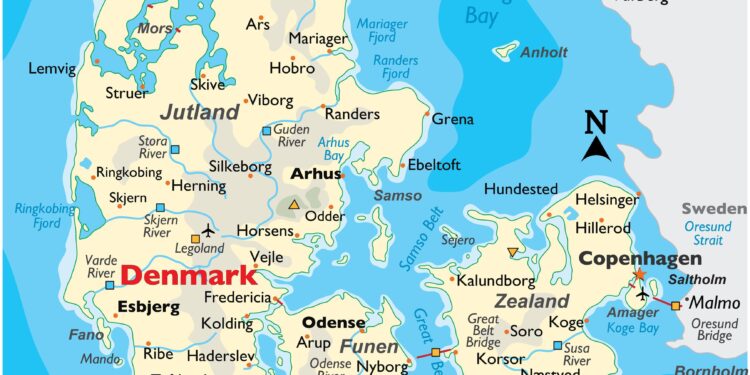As Denmark assumes the rotating presidency of the European Union, the member state is poised to steer the bloc through a complex and ambitious policy agenda. From climate action and digital transformation to economic recovery and geopolitical challenges, Copenhagen’s leadership will be under close scrutiny. In this article, we break down how policymakers, stakeholders, and observers can effectively navigate Denmark’s EU presidency priorities, offering insights into key initiatives and strategic opportunities that will shape the coming six months.
Denmark’s Strategic Priorities Under the EU Presidency: What to Expect in the Coming Months
Denmark’s EU presidency is set to emphasize a pragmatic and forward-looking approach, prioritizing green transition, digital innovation, and strengthening economic resilience across the bloc. Expect robust debates around the implementation of the European Green Deal, with Denmark aiming to accelerate legislative efforts to curb emissions and promote sustainable energy solutions. The digital agenda will focus heavily on securing digital markets and fostering innovation ecosystems, aiming to bridge gaps between member states in technology adoption and cybersecurity preparedness.
Additionally, Denmark intends to champion initiatives that reinforce social cohesion and public health recovery in a post-pandemic Europe. Key priorities include enhancing cross-border healthcare collaboration and fortifying supply chains to prevent future disruptions. Here’s a quick overview of the main themes Denmark will advance:
- Climate action: Accelerating renewable energy projects and carbon neutrality goals
- Digital transformation: Strengthening data governance and AI regulation
- Economic recovery: Stabilizing markets and fostering investment in innovation
- Health policy: Improving pandemic preparedness and healthcare collaboration
| Priority Area | Key Objective | Expected Outcome |
|---|---|---|
| Climate | Enhance Renewable Energy Targets | Stronger emission reduction commitments |
| Digital | Regulate AI & Data Privacy | Safer digital ecosystem for users |
| Economic | Boost Innovation Funding | Increased competitiveness in tech sectors |
| Health | Cross-border Health Cooperation | Improved response to health crises |
Key Policy Areas Shaping Denmark’s EU Agenda and Their Impact on Member States
Denmark’s strategic policy priorities during its EU presidency are set to influence both immediate and long-term directions for the Union. At the forefront is green transition and climate resilience, where Denmark pushes for more ambitious emissions targets and innovative energy solutions. This agenda not only shapes the EU’s collective climate response but also pressures member states to accelerate national reforms. Another critical area is digital sovereignty, focusing on enhancing cybersecurity and supporting ethical AI implementation. These priorities emphasize Denmark’s role in driving an EU that is less reliant on external technologies and more empowered in its digital identity.
Key policy domains also include social cohesion and economic recovery, reflecting a commitment to bridging disparities exacerbated by recent crises. Denmark advocates for sustainable economic growth that integrates digital skills development and labor market modernization. The emphasis on security and defense cooperation strengthens cross-border resilience against emerging threats, promoting a unified stance among member states. Below is a concise overview of the top focus areas and their expected ripple effects:
| Policy Area | Denmark’s Focus | Impact on EU Members |
|---|---|---|
| Green Transition | Stricter climate goals, renewable energy | Accelerated national climate plans, tech innovation boost |
| Digital Sovereignty | Cybersecurity, ethical AI frameworks | Enhanced data protection, reduced tech dependency |
| Social Cohesion | Inclusive growth, labor market reforms | Improved employment rates, social equity focus |
| Security & Defense | Joint crisis response, defense collaboration | Stronger EU-wide security architecture |
Expert Tips for Stakeholders to Engage Effectively with Denmark’s Presidency Initiatives
To maximize influence during Denmark’s EU presidency, stakeholders must prioritize proactive communication and regional collaboration. Building early connections with Danish officials and aligning initiatives with Denmark’s key policy priorities-such as green transition, digital innovation, and social cohesion-will enhance the relevance of your proposals. Engaging in targeted events, webinars, and roundtables hosted by the presidency offers a platform to contribute directly to the policy dialogue and to anticipate shifts in the legislative agenda. Monitoring Denmark’s official communications channels and policy briefings in real time is equally essential for timely interventions.
Effective engagement also hinges on understanding the nuanced balance Denmark aims to strike between progress and consensus within the EU framework. Stakeholders should leverage diverse coalitions-including NGOs, business networks, and academic institutions-to amplify their voice and demonstrate broad-based support. The table below outlines recommended engagement strategies mapped against Denmark’s thematic priorities, fostering a focused approach to advocacy efforts:
| Denmark’s Priority | Recommended Stakeholder Action | Engagement Channel |
|---|---|---|
| Green Transition | Present scalable sustainability projects | Environment-focused forums & policy workshops |
| Digital Innovation | Propose cybersecurity and AI policy inputs | Tech incubators & digital roundtables |
| Social Cohesion | Highlight inclusive social programs and research | Cross-sector dialogues & civil society summits |
Insights and Conclusions
As Denmark takes the helm of the EU presidency, navigating its policy agenda with clarity and strategic insight will be essential for stakeholders across Europe. By understanding the country’s priorities and approaches outlined in this article, policymakers, analysts, and observers alike can better anticipate the direction of EU discussions in the coming months. Staying informed and engaged remains key to making the most of Denmark’s leadership period and influencing outcomes that shape the future of the Union.
















